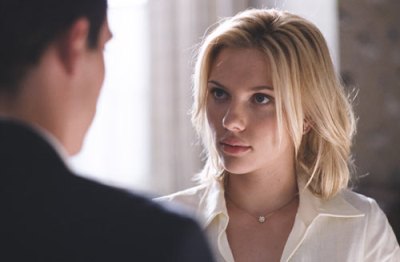| Reviews & Columns |
|
Reviews DVD TV on DVD Blu-ray 4K UHD International DVDs In Theaters Reviews by Studio Video Games Features Collector Series DVDs Easter Egg Database Interviews DVD Talk Radio Feature Articles Columns Anime Talk DVD Savant Horror DVDs The M.O.D. Squad Art House HD Talk Silent DVD
|
DVD Talk Forum |
|
|
| Resources |
|
DVD Price Search Customer Service #'s RCE Info Links |
|
Columns
|
|
|
Match Point
Dreamworks // R // January 20, 2006
List Price: Unknown [Buy now and save at Allposters]

"The world is getting to be such a dangerous place, a man is lucky to get out of it alive."
--W.C. Fields
At the film's opening, tennis pro Chris Wilton (Jonathan Rhys-Meyers) says, "I'd rather be lucky than good." His voice-over comes as the audience witnesses a tennis ball strike the net in slow motion and stall perfectly mid-net before falling as if by chance to one side or the other. Wilton is a former tennis player turned instructor who meets an elite English family; at the center are good boy Tom Hewett (Matthew Goode) and his sister Chloe (Emily Mortimer). Chris becomes enchanted by the Hewett's lifestyle, fancy dinners, expensive cars, and particularly Chloe who takes an intense and rather high school crush interest in him. Although her pursuit of Chris is too fairy tale to believe (why would an upper-class woman with everything be drawn to a sweat-stained racket jockey with nothing?), her courtship results in Chris's acceptance within the Hewett family and ultimately their marriage. Problematic in this turn of events is the simple fact that Chris has also become enchanted and pursuant of Nola Rice (Scarlett Johansson) an aspiring actress and Tom's fiance.
At first, Nola is flirtatious but indifferent. Her mannerisms and conversations with him are sultry and skirt the edges of innuendo. But soon after the two have a brief fling, she loses all interest and pushes him away. Chris becomes somewhat obsessed and they begin a secret love again. Ultimately, Chris is forced to decide between his wife and his lover; a sob story we've seen a dozen times. And although the final solution is mind-numbing and raw, the path to get there is too padded and predictable.
For the first half of the film, Johansson is keen in her role of Nola. Her expressions and the way she carries her self are as bawdy as her pouty lips. But during the turn of events, her character and believability lose control. Rhys-Meyers performs like a first-time actor, overtly and with a hunger for the camera's attention. His love for himself comes not only in his well-kempt, angular looks, but in the pompous notion that he is worthy of two beautiful women.
Woody Allen uses a number of engaging elements as backdrop to an otherwise mediocre story. Foremost are the exquisite shots of London, which Allen captures as surely and comfortably as he does his familiar city of New York. The Tate modern, the river Thames, skeet shooting on the great yard of the Hewett's mansion, each carry the weight of England and evoke the desire to visit the land across the pond. But amongst the cups of tea and promenades to the opera, Allen's script is too slight. Characters fall in and out of the plot too conveniently; for example, when Chris seeks out to find Nola in the busy streets of London he easily finds her, when he tries to avoid her, she easily and dramatically finds him. Alongside is poorly constructed and cumbersome dialogue (rather than moving us ahead it sends us in circles):
Chris: So you are aware of your affect on men?The riddle-like speak of the characters is one reason they are so difficult to believe. The other is that all are so downright selfish and manipulative in their own ways. For an audience to feel and accept them is too much of a stretch so they become too distanced.
Nola: They think I'd be something very special.
Chris: And are you?
Nola: No one's ever asked for their money back.
By the end of the film the mixed up lesson Woody Allen seems to suggest through Chris's infidelity, his manipulations and his lies, is that if you play with a house fire you're apt to stub your toe. In essence, nothing really matters because luck (or fate, if you prefer) is the ultimate decider. When we take a final, different (and pretty damn chilling) look at the frozen tennis ball metaphor and the resulting turn of events, we'll see that he's come to rely on luck because he so desperately needs it. And so might Allen, or his audience just might fall to the other side of the net.
|
| Popular Reviews |
| Sponsored Links |
|
|
| Sponsored Links |
|
|
| Release List | Reviews | Shop | Newsletter | Forum | DVD Giveaways | Blu-Ray | Advertise |
|
Copyright 2024 DVDTalk.com All Rights Reserved. Legal Info, Privacy Policy, Terms of Use,
Manage Preferences,
Your Privacy Choices | |||||||











